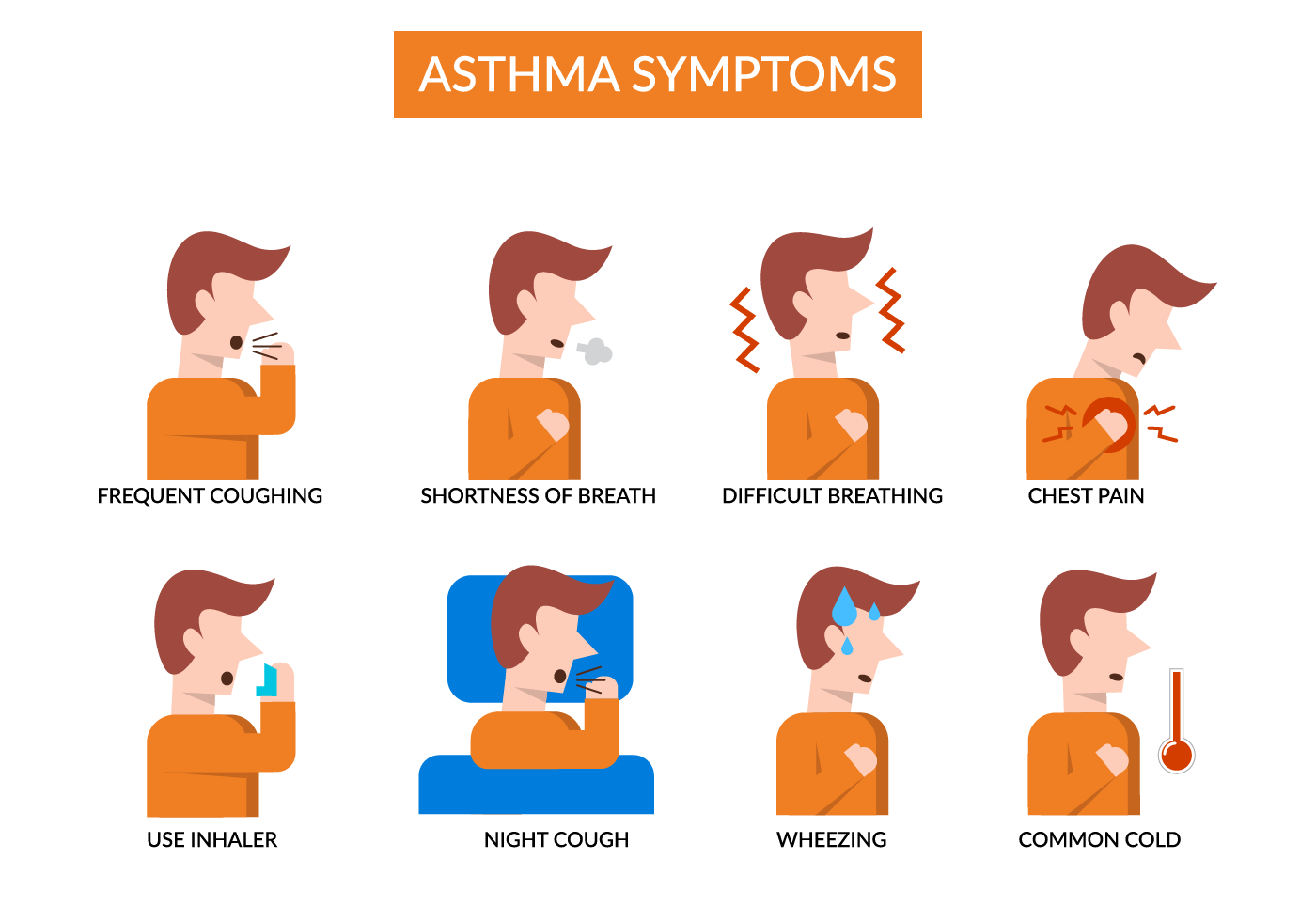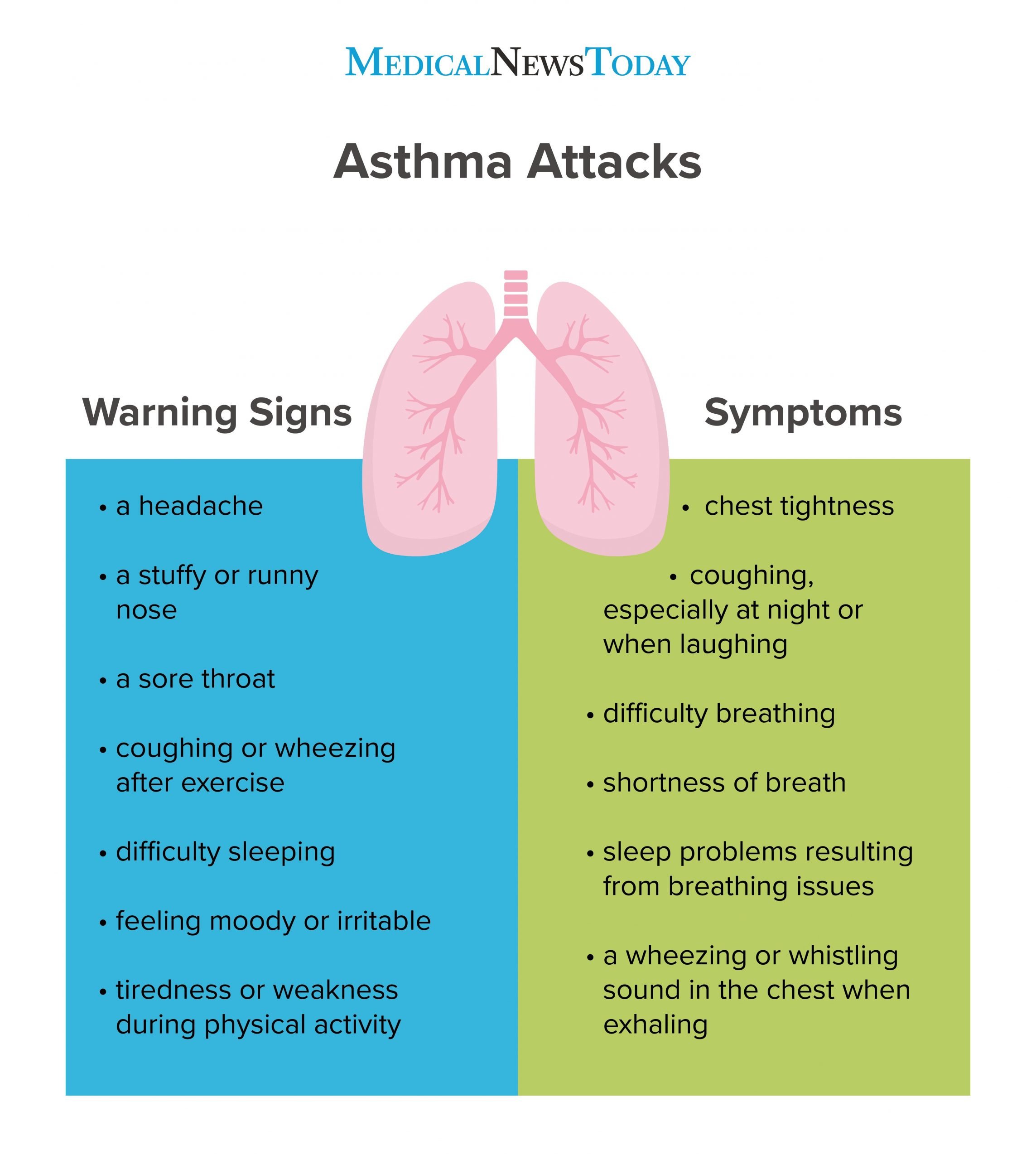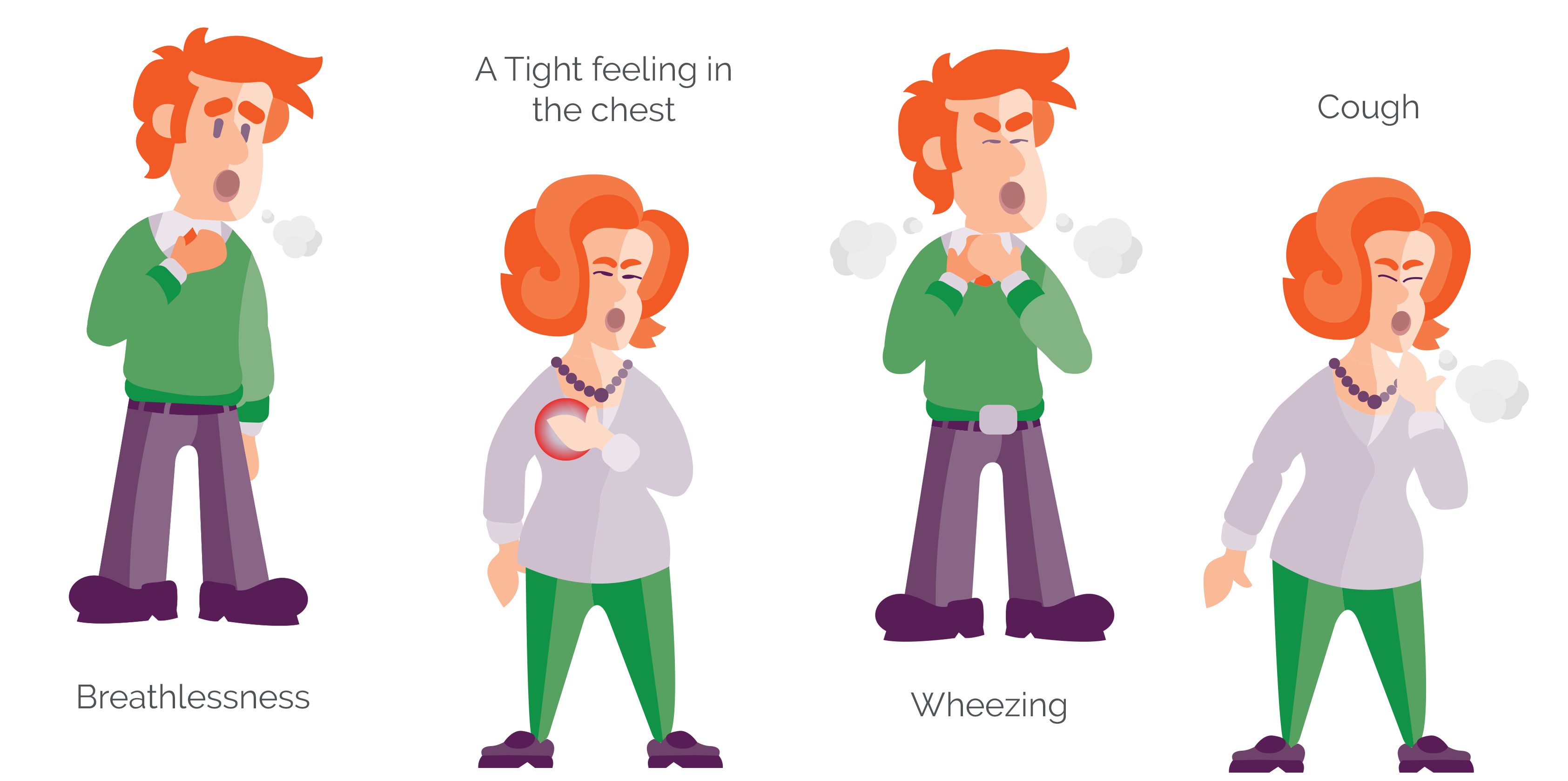What Causes Adults To Develop Asthma
At least 30% of adult asthma cases are triggered by allergies. People who are allergic to cats may have an increased risk for developing adult onset asthma. Exposure to allergens or irritants such as cigarette smoke, chemicals, mold, dust, or other substances commonly found in the persons environment might trigger the first asthma symptoms in an adult.
Prolonged exposure to certain workplace materials may set off asthma symptoms in adults.
Hormonal fluctuations in women may play a role in adult onset asthma. Some women first develop asthma symptoms during or after a pregnancy. Women going through menopause can develop asthma symptoms for the first time.
Different illnesses, viruses, or infections can be a factor in adult onset asthma. A bad cold or a bout with the flu is often a factor in adult onset asthma.
Smoking does not cause adult onset asthma however, if you smoke or if you are exposed to cigarette smoke , it may provoke asthma symptoms.
Know The Early Symptoms Of Asthma
Early warning signs are changes that happen just before or at the very beginning of an asthma attack. These signs may start before the well-known symptoms of asthma and are the earliest signs that your asthma is worsening.
In general, these signs are not severe enough to stop you from going about your daily activities. But by recognizing these signs, you can stop an asthma attack or prevent one from getting worse. Early warning signs of an asthma attack include:
- Frequent cough, especially at night
- Losing your breath easily or shortness of breath
- Feeling very tired or weak when exercising
If you have these warning signs, adjust your medication, as described in your asthma action plan.
What Are The Early Symptoms Of Asthma
If you have asthma or you arent completely sure whether or not you suffer from it, the signs of an asthma attack may come on gradually and manifest themselves just as your regular symptoms at first. However, as the attack worsens, these symptoms may become more severe over time.
The initial signs of an asthma attack include:
- Feeling tired and easily worn out after exercising.
- Coughing frequently at night.
- Wheezing and coughing incessantly after working out.
- Becoming out of breath easily.
- Trouble getting a good nights rest.
- Cold and allergy symptoms like a runny nose, sore threat, or headache.
Being familiar with these signs and symptoms can help you control your asthma and prevent an asthma attack from getting severe. If you have not been previously diagnosed with asthma but suffer from any of these symptoms, it would be wise to consult with your doctor as soon as you can. They may be able to give you some recommendations for controlling these symptoms. From breathing exercises to carry around an inhaler, getting relief will likely be slightly different for all of us. It is important to discuss your options with your doctor and formulate a plan of action.
Recommended Reading: Asthma In The Military
Signs Symptoms And Complications
How often signs and symptoms of asthma occur may depend on how severe, or intense, the asthma is and whether you are exposed to allergens. Some people have symptoms every day, while others have symptoms only a few days of the year. For some people, asthma may cause discomfort but does not interfere with daily activities. If you have more severe asthma, however, your asthma may limit what you are able to do.
When asthma is well controlled, a person shows few symptoms. When symptoms worsen, a person can have what is called an asthma attack, or an exacerbation. Over time, uncontrolled asthma can damage the airways in the lungs.
Explaining Your Symptoms To Your Gp

Its a good idea to start a diary of your symptoms before speaking to your GP. Taking note of when symptoms flare-up may help you to understand your triggers. This diary will then help your GP to understand and properly assess your condition. You could also try filming your symptoms if they are hard to describe.
There are several different tests for asthma – so your GP wont be able to diagnose you straightaway. Our advice on diagnosing asthma explains this process in more detail.
Read Also: Does Acid Reflux Cause Asthma
How Can You Tell If You Have Asthma
It can be hard to tell if someone has asthma, especially in children under age 5. Having a doctor check how well your lungs work and check for allergies can help you find out if you have asthma.
During a checkup, a doctor will ask if you cough a lot, especially at night. He or she will also ask whether your breathing problems are worse after physical activity or at certain times of year. The doctor will then ask about chest tightness, wheezing, and colds lasting more than 10 days. He or she will ask whether anyone in your family has or has had asthma, allergies, or other breathing problems. Finally, the doctor will ask questions about your home and whether you have missed school or work or have trouble doing certain things.
The doctor may also do a breathing test, called spirometry, to find out how well your lungs are working by testing how much air you can breathe out after taking a very deep breath before and after you use asthma medicine.
What Is Asthma Anyway
First up, a little anatomy refresher: Your airways, which extend between your nose and mouth and your lungs, have the very important job of carrying air in and out of your body, according to the National Heart, Lung, and Blood Institute . When you have asthma, triggers like animal fur, pollen, mold, cold air, cigarette smoke, exercise, and respiratory infections like colds cause your airways to get inflamed, according to the NHLBI. That inflammation can cause swelling, which in turn can prompt the muscles around your airways to tighten, making it hard to get air in and out. At the same time, your airways might also expel more mucus than they usually do, making it even harder to breathe.
Experts dont know exactly what causes some people to get asthma when others dont, but its pretty safe to assume that its probably a combination of environmental factors and genetic factors. For example, if someone in your immediate family has asthma, youre more likely to have it too, according to the Centers for Disease Control and Prevention . Beyond that, the general cause is a stronger-than-normal response from your immune system to certain triggers, which is why you get all that inflammation when people without asthma dont, says the NHLBI.
Recommended Reading: Does Ibuprofen Make Asthma Worse
What Should I Do If I Think I Have Asthma
If you think that you have asthma, the best thing you can do is see your healthcare provider as soon as possible for proper testing and diagnosis. Many people normalize their symptoms, without ever realizing that a symptom-free life could be possible. Its crucial to never ignore or downplay your asthma symptoms, you never know when something could trigger a potentially fatal asthma attack.
The sooner that you get a proper diagnosis and treatment plan, the sooner you can take control of your asthma and live life to the fullest.
How Is The Condition Diagnosed
To diagnose asthma, your physician will question you about your symptoms, perform a physical exam, and conduct lung function tests. You also may be tested for allergies.
Your internist or family physician may refer you to an allergist or pulmonologist for specialized testing or treatment.
After middle age, most adults experience a decrease in their lung capacity. These changes in lung function may lead some physicians to overlook asthma as a possible diagnosis.
Untreated asthma can contribute to even greater permanent loss of lung function. If you have any asthma symptoms, dont ignore them, and dont try to treat them yourself. Get a definitive diagnosis from your health care provider.
Don’t Miss: Is Asthma Worse At Night
Allergies Linked To Asthma
Allergies and asthma often coexist. Indoor allergies are a predictor of who might be at risk for an asthma diagnosis. One nationwide study showed levels of bacterial toxins called endotoxins in house dust were directly related to asthma symptoms.
Sources of other indoor allergens include animal proteins , dust mites, cockroaches, fungi, and mold. Changes that have made houses more “energy-efficient” over the years are thought to increase exposure to these causes of asthma.
Overview Causes & Risk Factors
Asthma is a common lung disease that causes repeated bouts ofwheezing, shortness of breath, chest tightness, and coughing, especially atnight or in the early morning. A person with asthma has difficulty breathingbecause of inflammation and narrowing of the airways.
What is going on in the body?
In a person with asthma, the airways narrow as a result of irritation and inflammation.During an asthma flare-up or asthma attack, muscles of the airwaytubes, or bronchi, tighten. The reaction in the lungs is out of proportion withthe amount of stimulation experienced. The inflammation and tightening in theairways increases, trapping air in the lungs. The overreaction to the triggercauses excess mucus to form in the lungs. The person cannot take in a fullbreath and feels short of breath.
Sometimes the reaction to the trigger causes swelling throughout the entirebronchial tube. The opening in the center of the tube then becomes smaller, andbreathing becomes more difficult. When the muscles relax, the bronchial tubesopen wider. Asthma symptoms then resolve, and breathingbecomes easier.
What are the causes and risks of the disease?
Asthma is caused by an immune system response. The immune system overreacts totriggers and causes the airways to become inflamed and tight. Often there areprovoking factors, or triggers, that cause asthmasymptoms. Triggers differ from person to person. Asthma triggers include:
Also Check: Qvar And Weight Gain
What Are Signs And Symptoms Of Adult Onset Asthma
Regardless of age, asthma symptoms can include:
Dry cough, especially at night or in response to specific triggers
Tightness or pressure in the chest
Wheezing a whistling sound when exhaling
Shortness of breath after exercise or physical exertion
Difficulty breathing
Colds that go to the chest or hang on for 10 days or more
Your Chest Feels Tight

After running a 10K race, Anne-Marie Brooks had trouble breathing and felt a tightness in her chest. Her husband, concerned that the exertion might have brought on a heart attack, took her to the emergency room. There, the 48-year-old teacher learned she wasnt suffering from cardiac trouble but from something she thought shed left behind 36 years earlierasthma. It never dawned on me that I might be having an asthma attack, Brooks says. When this happens you may experience chest tightness, shortness of breath and a cough, explains Yelena Kopyltsova, MD, of ENTA and Allergy Associates. People often mistake this tightness for heart attacks. Your physician or an ER can figure out whats going on and provide appropriate treatment.
Dont miss these silent signs you may have heart murmur.
You May Like: Can Cold Weather Trigger Asthma
What Kind Of Physician Treats Adult Onset Asthma
Many older patients are treated for asthma by their internist or family physician however, if your asthma symptoms are not under control within three to six months, or if you have severe persistent asthma, or if you are having asthma episodes that need emergency treatment, it may be time to see an asthma specialist. Allergists/Immunologists or pulmonologists are specialists who treat asthma. Those who have completed training in those specialties are usually called board-certified or board-eligible.
What You Can Do Right Now: Indoor Air Quality
If you suffer from any of the above symptoms, you may want to consider taking a closer look at the air you breathe. Its possible that something in your home may be a trigger for some of your symptoms. While you would need to discuss these potential triggers with your doctor, improving your indoor air quality is one of the most important things you can do for your health. This is especially true if somebody in your home is smoker.
Whether you buy a bunch of houseplants to help purify your air, or buy an air purifier designed with asthma sufferers in mind, there are many things you can do right now to improve your indoor air quality. It may not have a direct effect on your asthma symptoms, but its always good to breathe in more of the pure oxygen your body craves and less of the potentially-harmful pollutants that sometimes come along with it.
Recommended Reading:
You May Like: Does Weight Gain Make Asthma Worse
How To Tell You Have Asthma
In this section: Diagnosis and Lung Testing | How To Tell You Have Asthma | Your Healthcare Team
Asthma is a complex disease to diagnose, and only a healthcare professional is able to make a proper diagnosis.
If you are concerned that you may have asthma, contact your healthcare provider. In order to confirm an asthma diagnosis, your healthcare provider will take into account your medical and family history, allergies, and conduct lung function testing such as spirometry.
Asthma Information For Childcare Kinder Or School
To assist childcare and preschool workers and school teachers in the care of your child with asthma:
- Tell them that your child has asthma .
- Provide them with a copy of your childs asthma action plan, including emergency contact details. Make sure you provide an updated plan every year, or if your childs medication changes.The school or childcare centre will require this for enrolment.
- Show staff members how to use the medication devices, such as spacers and puffers.
- Make sure your child has an up-to-date supply of medication and a spacer at the centre or school.
- Notify staff if your childs asthma changes.
- Tell the staff about any concerns you may have.
Read Also: Can You Join The Air Force With Asthma
What Are The Signs Of An Asthma Attack
If you do have asthma, it is important to not only know the signs and symptoms of the condition, but to also be aware of the signs of an asthma attack. An asthma attack happens when the muscle surrounding your airways is prompted to tighten, otherwise known as a bronchospasm. When you have an asthma attack, your airways will become swollen and start producing more mucus then they usually would.
When you have an asthma attack you may experience the following signs:
- Pain or pressure in your chest.
- Coughing that wont stop.
- Feelings of panic and anxiety.
- Rapid breathing accompanied by wheezing when you breathe in and out.
- Problems talking and a sweaty or pale face.
Remember, these symptoms can increase rapidly as the asthma attack progresses. Watch out for these signs and use your inhaler or bronchodilator if you notice that they start to worsen. It is also important to remember that not wheezing anymore isnt a sign of improvement in an asthma attack. When you stop wheezing, your lungs will have tightened so much that there is not enough air movement throughout your lungs for your body to produce this wheezing effect. This problem can be fatal, which is why it is essential to seek emergency care as soon as possible.
Taking Medications As Prescribed
Developing an effective medication plan to control a child’s asthma can take time and trial and error. Different drugs work more or less effectively for different kinds of asthma, and some drug combinations work well for some children but not for others.
There are two main categories of asthma medications: quick-relief medications and long-term preventive drugs . Asthma drugs treat both symptoms and causes, so they effectively control asthma for nearly every child. Over-the-counter drugs, home remedies, and herbal combinations are not substitutes for prescription asthma medication because they cannot reverse airway obstruction and they do not address the cause of many asthma flares. As a result, asthma is not controlled by these nonprescription drugs, and it may even become worse with their usage.
You May Like: How To Make A Homemade Inhaler For Asthma
Triggers For Asthma In Children
Asthma triggers are substances, conditions or activities that lead to asthma symptoms. These include :
- wheezing whistling noise when breathing
- coughing .
Your child may have all of these symptoms or just a few. Symptoms are often worse at night, in the early morning, during exercise or due to other triggers.
Side Effects Of Asthma Medication

If you are worried about possible side effects from asthma medication, speak to your doctor. Do not stop or reduce doses of medication for your child without speaking with your doctor. Common side effects from inhaled asthma medication:
Preventers
- sore mouth and throat
- fungal throat infections.
Using a spacer reduces the risk of these side effects. as does rinsing the mouth with water after using an inhaler.
Relievers
- fast heart beat.
You May Like: Is Asthma A Small Airway Disease
The Impact Of Asthma On Daily Life
Asthma is often under-diagnosed and under-treated, particularly in low- and middle-income countries.
People with under-treated asthma can suffer sleep disturbance, tiredness during the day, and poor concentration. Asthma sufferers and their families may miss school and work, with financial impact on the family and wider community. If symptoms are severe, people with asthma may need to receive emergency health care and they may be admitted to hospital for treatment and monitoring. In the most severe cases, asthma can lead to death.
How Do You Monitor Asthma Symptoms
Monitoring your asthma symptoms is an essential piece of managing the disease. Your healthcare provider may have you use a peak flow meter. This device measures how fast you can blow air out of your lungs. It can help your provider make adjustments to your medication. It also tells you if your symptoms are getting worse.
Recommended Reading: Does Fluticasone Cause Weight Gain
